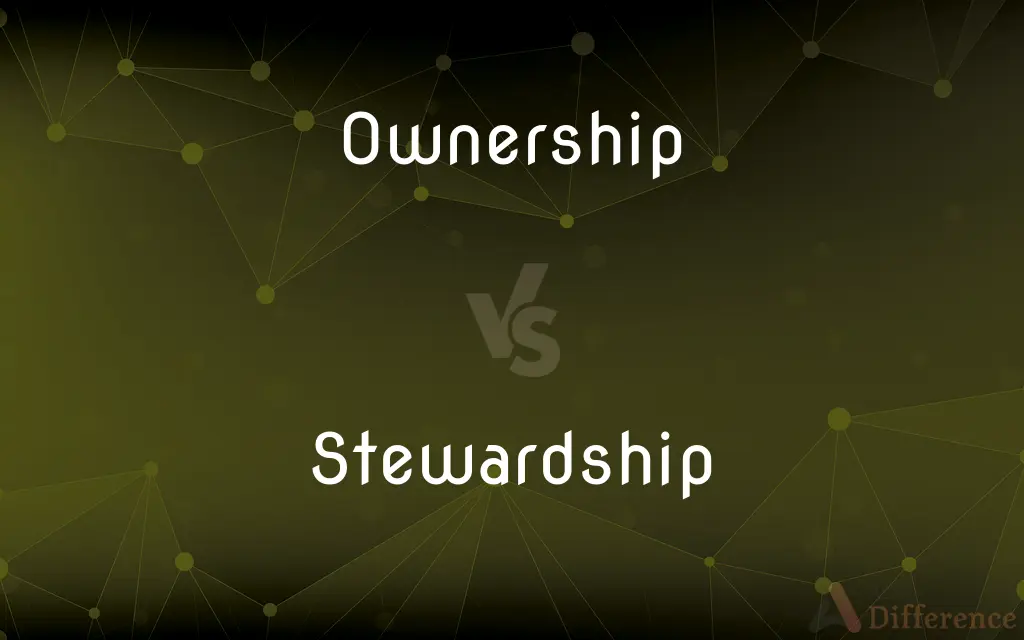Ownership vs. Stewardship — What's the Difference?
By Tayyaba Rehman — Updated on September 27, 2023
Ownership implies possession and control over an asset or property; stewardship emphasizes responsible management and care of what one oversees, often focusing on sustainability and the welfare of others.

Difference Between Ownership and Stewardship
Table of Contents
ADVERTISEMENT
Key Differences
Ownership refers to the state of possessing, controlling, and having legal rights over an asset or property, with the owner bearing the rights and responsibilities related to it. Conversely, Stewardship is about taking responsibility to manage and care for resources, properties, or the interests of others, often with a focus on sustainability and ethical considerations.
Ownership involves having the authority to make decisions about the property, asset, or resource, typically with a focus on personal interest or gain. In contrast, Stewardship implies a commitment to serve the broader good, emphasizing the ethical management and protection of resources, even in the absence of legal ownership.
While Ownership often results in personal benefit and may involve using the asset or resource solely for the owner's interest, Stewardship, with its inherent sense of duty, seeks to balance individual interests with the well-being of others and the sustainable use of resources.
In Ownership, the emphasis is often on rights and privileges associated with possessing an asset or property, potentially leading to exclusivity. Stewardship, on the other hand, underscores inclusivity and shared responsibility, aiming for the responsible and ethical use of resources to benefit the community or environment.
The concept of Ownership tends to emphasize the legal and exclusive possession of assets or resources, allowing for autonomous decision-making. Stewardship, meanwhile, prioritizes accountability, responsibility, and sustainable and ethical management, often transcending personal or legal boundaries.
ADVERTISEMENT
Comparison Chart
Focus
Possession and control
Responsible management and care
Primary Concern
Personal interest or gain
Sustainability and the welfare of others
Decision-making Authority
Exclusive to the owner
May involve shared responsibility and collective decisions
Emphasis
Rights and privileges
Accountability and duty
Outcome
Personal benefit, exclusivity
Inclusive benefit, sustainable use of resources
Compare with Definitions
Ownership
Ownership is having legal rights and control over property or asset.
His sense of ownership grew as he paid off his mortgage.
Stewardship
Stewardship is the ethical management and protection of resources.
His stewardship of the forest ensured its preservation for future generations.
Ownership
Ownership implies possession and entitlement to an asset.
The ownership of the painting was disputed for years.
Stewardship
Stewardship entails accountability and shared responsibility.
Through stewardship, they collaboratively enhanced the environmental conditions of the area.
Ownership
Ownership can lead to personal benefit and exclusivity.
His ownership of the land enabled him to profit from its resources.
Stewardship
Stewardship involves responsible care for the interests or properties of others.
Under her stewardship, the company thrived and maintained its ethical standards.
Ownership
Ownership confers the authority to make decisions about an asset.
With ownership comes the responsibility to maintain the property.
Stewardship
Stewardship emphasizes sustainability and the welfare of others.
The stewardship of the land involved implementing sustainable agricultural practices.
Ownership
Ownership is the state or fact of exclusive rights and control over property, which may be any asset, including an object, land or real estate, intellectual property, or until the nineteenth century, human beings. Ownership involves multiple rights, collectively referred to as title, which may be separated and held by different parties.
Stewardship
Stewardship is an ethic that embodies the responsible planning and management of resources. The concepts of stewardship can be applied to the environment and nature, economics, health, property, information, theology, cultural resources etc.
Ownership
The act, state, or right of possessing something
The ownership of land
The rise in car ownership
Stewardship
One who manages another's property, finances, or other affairs.
Ownership
The state or fact of being an owner.
Stewardship
One who is in charge of the household affairs of a large estate, club, hotel, or resort.
Ownership
A group that owns something
The ownership of the team wants to make a trade for a better pitcher.
Stewardship
A ship's officer who is in charge of provisions and dining arrangements.
Ownership
The state of having complete legal control of something; possession; proprietorship.
Stewardship
An attendant on a ship or airplane.
Ownership
(business) Responsibility for something.
The successful candidate will take ownership of all internal design projects.
Stewardship
An official who supervises or helps to manage an event.
Ownership
The state of being an owner; the right to own; exclusive right of possession; legal or just claim or title; proprietorship.
Stewardship
A shop steward.
Ownership
The relation of an owner to the thing possessed; possession with the right to transfer possession to others
Stewardship
A wine steward.
Ownership
The act of having and controlling property
Stewardship
To serve as a steward or as the steward of.
Ownership
The state or fact of being an owner
Stewardship
The rank or office of a steward.
Ownership
Ownership involves enjoying the privileges associated with possessing an asset.
Through ownership, she could remodel the house as she pleased.
Stewardship
The act of caring for or improving with time.
Foresters believe in stewardship of the land.
Stewardship
The office of a steward.
Stewardship
The position of steward
Stewardship
Stewardship seeks to balance individual interests with the well-being of the community.
His stewardship in the community aimed at fostering unity and mutual support.
Common Curiosities
Does Ownership always imply responsible management?
Ownership implies rights and control but does not inherently ensure responsible or ethical management of the asset.
Does Stewardship require legal ownership?
No, stewardship does not require legal ownership and can involve managing resources or interests for the benefit of others.
What does Ownership entail?
Ownership entails having legal rights, control, and possession over an asset or property.
Can Ownership be transferred?
Yes, ownership can be legally transferred through sales, gifts, or inheritance.
Can one have Ownership without possession?
Legally, one can have ownership rights without physical possession, such as in the case of leased properties.
Is Stewardship synonymous with Ownership?
No, stewardship emphasizes responsible and ethical management and care, often focusing on sustainability, whereas ownership emphasizes possession and control.
What is the main goal of Stewardship?
The main goal of stewardship is responsible, ethical, and sustainable management and care of resources or interests.
Does Ownership always lead to personal gain?
While ownership provides the right to use the asset for personal gain, it does not guarantee profit or benefit.
Does Stewardship imply a duty to others?
Yes, stewardship implies a duty and responsibility to manage resources ethically and sustainably for the benefit of others.
Can Stewardship lead to communal benefit?
Yes, stewardship often seeks communal benefit and the sustainable and ethical use of resources.
Can Stewardship involve shared responsibility?
Yes, stewardship often involves shared responsibility and collective decision-making for the welfare of others.
Can Ownership be disputed?
Yes, ownership can be disputed and may require legal intervention to resolve.
Can Ownership and Stewardship coexist?
Yes, an owner can exercise stewardship by managing their assets or property responsibly, ethically, and sustainably.
Is Ownership a legal concept?
Yes, ownership is a legal concept involving rights, control, and possession of property or assets.
Does Stewardship prioritize sustainability?
Yes, stewardship often prioritizes sustainability, ethical management, and the well-being of the community and environment.
Share Your Discovery

Previous Comparison
Cool vs. Chill
Next Comparison
Currently vs. CurrentAuthor Spotlight
Written by
Tayyaba RehmanTayyaba Rehman is a distinguished writer, currently serving as a primary contributor to askdifference.com. As a researcher in semantics and etymology, Tayyaba's passion for the complexity of languages and their distinctions has found a perfect home on the platform. Tayyaba delves into the intricacies of language, distinguishing between commonly confused words and phrases, thereby providing clarity for readers worldwide.















































